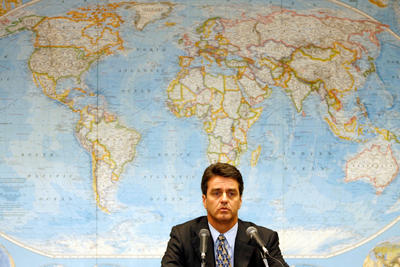In a world of such disparity and inequality, the appointment of a Brazilian as head of the WTO has generated hope among the two-thirds of the world population and three-fourths of the WTO membership who belong to the developing world. But working to appease the developing world and restoring faith in the WTO’s ability to settle long-running disputes in world trade negotiations will be a monumental task. The biggest challenge before Azevêdo now is to strengthen multilateral cooperation — because it is the only international mechanism that can be acceptable to all.
It’s well recognised that multilateralism, especially in the economic- and trade-related spheres, has yielded rich dividends for a large number of countries. The gains accrued from the system have led these beneficiaries to adopt complementary policies and integrate further with the world economy. The WTO’s rule-based arrangements and institutional mechanisms have strengthened multilateralism and enabled countries to reduce tariffs to a reasonable level, allowing world trade to flourish. Multilateralism has thus helped to restore confidence among countries ever since the WTO’s inception in 1995.
However, the current Doha round of multilateral trade negotiations has not delivered the expected benefits. Critical issues like negotiations in agriculture, non-agricultural market access and the services sector still remain unresolved. The inability to finalise these negotiations has raised doubts about the role of multilateralism in world trade today. The challenges before Azevêdo are therefore many and varied.
Significant tariff reductions may have increased global trade, but the simultaneous rise in non-tariff barriers is equally decreasing such prospects. Non-tariff barriers such as rules of origin, sanitary and phytosanitary requirements, licensing, and technical qualifications are curtailing the export prospects of developing countries. US and EU campaigns to enforce a range of ecological standards and green technologies are further restricting developing countries’ integration with the world market.
While the spectre of the global financial crisis may be receding, protectionist policies in industrialised countries and a lack of trade finance are still curtailing the export interests of developing states.
The unfulfilled desires and expectations of the world’s least-developed countries seem to question how well the international trade regime is functioning. Many of these countries feel the institutional make-up of the WTO — that is, the procedural requirements — is too costly and beyond their technical expertise.
The stalled Doha negotiations have also resulted in a proliferation of regional trade agreements and trade blocs that are slowly eroding the importance of multilateralism.
A number of countries are becoming more insular. They are fostering domestic demand-driven growth models, after the global financial crisis revealed that high export-led growth could be problematic for developing countries. Such inward-looking models may slow down the progress of multilateralism.
The present uncertainty over the Doha negotiations and global developments since 2008 have given rise to greater apprehension among developing countries as to how the global economy will behave in the foreseeable future. Economic slowdown, volatility and uncertainty in the world economy have impacted almost all nations, and the impact has been particularly severe in those economies with deeper and more extensive global relationships. Many feel that the largely unregulated and irresponsible behaviour of multilateral financial institutions, which led to the financial crisis, has been instrumental in damaging the current progress of multilateralism.
Many countries are adhering to exchange rate management policies to help their exports. This mechanism is currently being used by a number of countries because the WTO has prevented member states from indulging in other trade-promoting measures like subsidies or export incentives. There is a growing apprehension that such exchange rate mechanisms may lead to procedural currency problems among some countries. Uncooperative behaviour in the currency market may also lead to confusion and mistrust among WTO member states.
Issues like trade facilitation, environmental standards and government procurement are currently taking centre stage in trade negotiations, which is sidelining core issues like development — on which the foundations of the Doha talks were laid. Developmental concerns like food security and rural employment need to be settled first before negotiations on non-developmental issues can take off.
Given that multilateral arrangements are by their very nature inclusive and non-discriminatory, the benefits of pursuing this form of interaction accrue to all, and particularly to less-developed nations. There is a real need to recognise the importance of maintaining a highly interdependent and interconnected world, and that multilateralism is the only means of creating such a world — because human progress is multilateral. The task before Azevêdo is to restore confidence and trust in multilateralism, by actively consulting with all WTO member states before the ninth ministerial summit in December 2013.
Anil Kumar Kanungo is a member of the research division at the Indian Institute of Foreign Trade, New Delhi.

